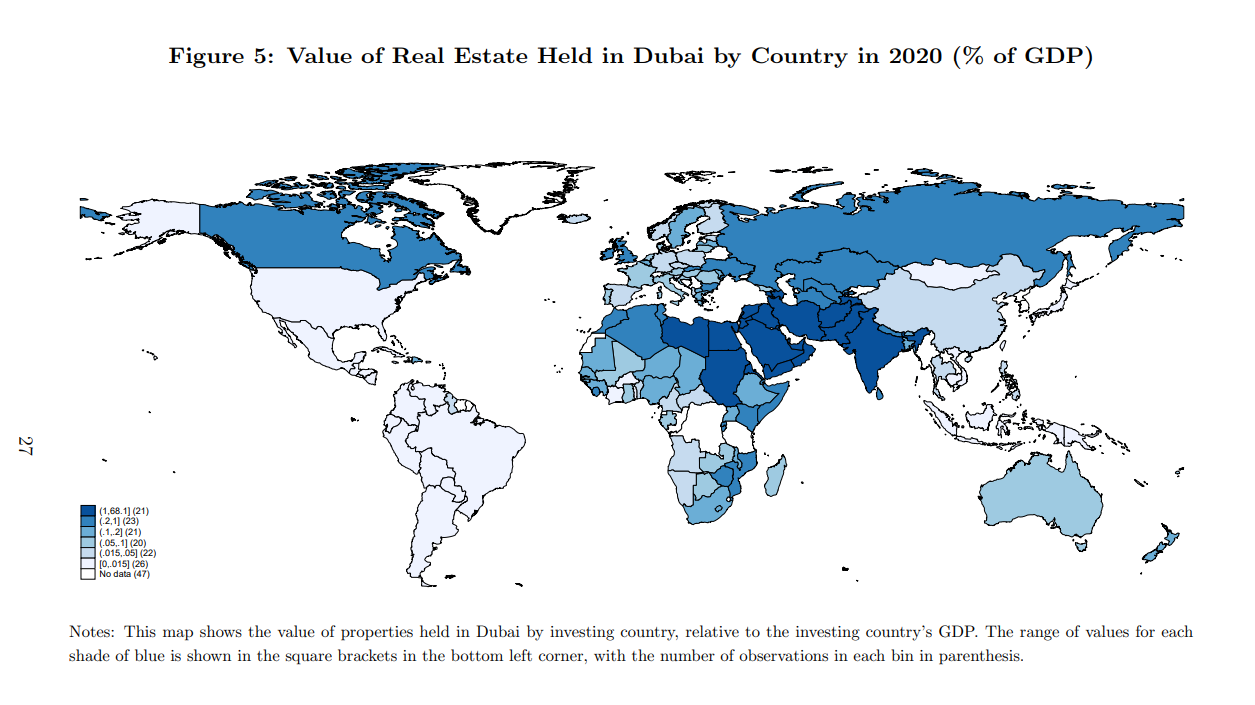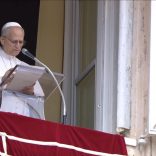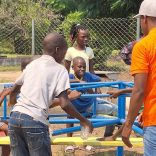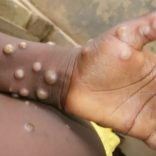A father’s hope for his malnourished son in rural Cabo Delgado
Mozambique: 7000 ghost soldiers; $78 mn in Dubai; squeeze on NGOs, press, religious bodies – By Joseph Hanlon

In this issue
Civil war
- 7000 ghost soldiers
- War intensifying again
- Police kidnapping Macomia business people
- 24 countries have military in Cabo Delgado
- IS and US up the rhetoric
- Slow return to Mocimboa da Praia
Other news
- Mozambicans own $78 mn in Dubai
- Squeeze on NGOs, religious bodies, press
The civil war
7000 ghost soldiers found
Soldiers have been paid in cash, and in March actually had to show up to collect. According to Carta de Moçambique (4, 6 May) 7000 ghost soldiers were found. “Among the irregularities detected in recent months is the growing number of children of former combatants, generals, colonels and politicians, who swell the ranks of the FADM and receive salaries without ever having been in military training, let alone setting foot in a military unit,” noted Carta. And many salaries of fake solider were being channelled to senior officials. The scheme also includes the distribution of food, alcoholic beverage, fuel vouchers and rent subsidy. The military will now switch to electronic payments.
War intensifying again
There has been an attacks in Palma near the Afungi gas base, in a zone which supposedly had been cleared by Rwandans. On 6 May insurgents hit Olumbe, 20 km south of the Afungi camp, just to steal food and clothing; Mozambicans soldiers nearby did not respond. There is some confusion in reports between this attack and the two below in Macomia along the coast.
In Quiterajo in coastal Macomia on 7 May insurgents attacked an army base; 3 Mozambican soldiers were beheaded. Weapons and ammunition was taken and the base burned. Rwandan troops eventually arrived and killed some insurgents. The Olumbe and Quiterajo raids seem to have been for food, clothing and weapons and the beheadings suggests the insurgents were only armed with machetes.
In Pangane near Quiterajo on 7 or 9 May, Rwandan troops surrounded a house of a local businessman where insurgents were staying, and opened fire and killed everyone in the house.
And fighting is increasing in Nangade district. The Nangade-Mueda road has been closed since 1 May, leaving Nangade town cut off from supplies. (Cabo Ligado, Rhula, Lusa, Pinnacle)
Police kidnapping business people in Macomia
When national police commander Bernardino Rafael was in Macomia town on 13 May local people complained to him about misconduct by the local riot police (UIR, Unidade de Intervenção Rápida) who they accused of physical aggression, extortion, and even kidnapping local business people and holding them for ransom. He said he would investigate, but when on to ask why they were in the district town at all, when they should be out fighting the enemy. People had complained to the district commander about the kidnappings the week before, and he was not present at the meeting with Rafael. (Radio Moçambique 14 May, Carta de Moçambique 16 May)
In north west Macomia in the contested area near Chai, Cabo Ligado (10 May) reports that civilians “have suffered mistreatment at the hands of government security forces. In Macomia, on 28 April, around seven youths fishing along the Messalo river near Chai were beaten and robbed by Local Forces militia, who stole their fishing nets, fish, and money.”
24 countries have military people in Cabo Delgado
The foreign military presence in Cabo Delgado continues to grow, and 24 countries now have a military personnel there. The SADC mission in Mozambique (SAMIM) has troops from 10 countries, mostly from South Africa. The EU training mission has personnel from 11 countries, although most are from Portugal. Rwanda has more than 2000 soldiers and police in Cabo Delgado. The US has a training mission. And Uganda has a presence.
Ugandan troops likely: President Filipe Nyusi visited Uganda and President Yoweri Museveni 27-30 April. Museveni received military training from Frelimo in Cabo Delgado in 1976-8, leading to the overthrow of Idi Amin in 1979. Close links with Frelimo have continued, and Museveni said he had already been supporting the Mozambican military in the Cabo Delgado war and proposed deploying a large Ugandan force there. President Nyusi said some of the support would go to local militias.
EU considering support for Rwandan mission: The European Union (EU) is considering spending up to $21 million to support the Rwandan counter-insurgency mission in Mozambique’s Cabo Delgado province. The plan is detailed in a “concept note” and provides for “non-lethal aid”, such as vehicles and logistical equipment. The funding would be provided through the European Peace Facility. (EU Observer 10 May)
IS and US up the rhetoric
Islamic State has begun calling Cabo Delgado insurgents IS Mozambique, adopting the label first imposed by the United State in March last year. Although the insurgency is still largely domestic and there is no evidence that IS plays a major role, it appears that the two global actors have decided that Mozambique is to be one of their battlegrounds. And on 4 April the US named Mozambique as one of five countries given special attention under the Global Fragility Act (GFA).
According to the US Institute of Peace (5 Apr) the number one criteria from choosing a GFA country is “US national security interests.” The US, as usual, is offering a lot of money – but do Mozambicans want their country to be used for another proxy war? The one in the 1980s cost the lives of 1 million Mozambicans.
The IS and GFA labels appear to have been applied without talking to Mozambicans. The GFA act requires consultation with national and local government and local NGOs. The US State Department said Acting Assistant Secretary for Bureau of Conflict and Stabilization Operations Robert Faucher during his visit to Maputo in October 2021 held “consultations with government counterparts, civil society representatives, and other partners” on the GFA designation, but refused to give more details.
Very slow return to Mocimboa da Praia
Civil Servants must return to Mocimboa da Praia by the end of this week, mayor Cheia Carlos Momba ordered. Offices have not been rebuilt and instead they will use container size portable offices supplied by TotalEnergies. There is, however, no housing. But Mozambique has its priorities right. Frelimo secretary general Roque Silva reported 9 May that the rehabilitation of its offices in Palma and Mocimboa da Praia is nearly complete.
At least 120 civil servants have already returned to Diaca administrative post in Mocímboa da Praia district but near Mueda. They complain that minimum conditions are lacking.
Displaced people are not being allowed to return to Mocimboa da Praia town, but some are returning to Diaca, near the much fought over road junction at Awasse in the west of Mocimboa district adjoining Mueda. It is a zone where some people remained during the insurgent occupation. Police report that they “accompanied” 1500 returnees to Awasse in early May.
All 3700 people displaced from villages by armed attacks in Mecula, Niassa, in December and January and who had been sheltering in the district town have returned home, the Secretary of State for Niassa, Dinis Vilanculos, said. (Lusa 13 May) On April 19, the Niassa Special Reserve announced the resumption of tourist activities,
No amnesty. The national police commander Bernardino Rafael said “the war is nearly over” and invited insurgents to turn themselves into the authorities and hand in their weapons. But he said nothing about a formal amnesty. (Radio Moçambique 14 May)
The United Nations World Food Programme (WFP) is halving food rations for the displaced because it will run out of money next month. Its feeding programme costs $17.3 mn per month. War, cyclones and an erratic rainy season are leading to predictions of food shortage.
No local content requirements for gas projects will be imposed because the private sector cannot just depend on government protection, President Filipe Nyusi told the Mozambican business association, the CTA, on 29 March. Protection legislation distorts prices and corrodes competitiveness, he said. (@Verdade 30 March)
Other news
- 67 Mozambicans own $78 mn of properties in Dubai
A new study of offshore real estate in Dubai shows that 67 Mozambicans own 359 properties worth $78 mn in Dubai. Only 28% are owned by women. Mozambique has significantly more property in Dubai than other Africa countries, measured as a share of GDP, which suggests many rich Mozambicans moving their money there.
Mozambican property in Dubai are valued at 0.53% of GDP (that is, one half of one per cent of Mozambican GDP – quite a lot of money). By contrast Zimbabwe properties in Dubai are only 0.24% of GDP and both Malawi and South Africa are 0.18% of their GDP. That means rich Mozambicans are squirreling away three times as much money in Dubai as the rich in South Africa or Malawi.
The paper was published 2 May by the EU Tax Observatory and is HERE. The data table is https://gabriel-zucman.eu/files/APZO2022Data.xlsx
An investigation of the Pandora Papers by the International Consortium of Investigative Journalists reported United Arab Emirates a go-to offshore haven for Africa’s political and business elite. Dubai is the largest city in the UAE. Former Mozambican Finance Minister Manuel Chang was arrested in December 2018 in South Africa on his way to Dubai.
- New squeeze on NGOs, religious bodies, press
The parliament session has been extended to this week to impose new restrictions of religious organisations, non-government organisations (NGOs), and the press.
Parliament last week approved a detailed new law to reduce money laundering and financing terrorism. It has a special section (art 57) covering non-profit organisations, which are not defined but clearly include NGOs, charities, foundations and religious bodies. The new law says:
- “Non-profit organisations must publish annual financial statements that include a detailed breakdown of their income and expenditure.
- “Non-profit organisations should have adequate control mechanisms in place to ensure that all funds are properly accounted for and used in accordance with the object and purpose of the organisation’s stated activities.
- “Non-profit organisations should keep, for a period of 8 years, records of domestic and international operations in sufficient detail to enable verification that funds have been used in accordance with the object and purpose of the organisation.
- “Any donations or other financial contributions of any kind to non-profit organisations must be made by bank transfer to an account opened in the name of the organisation or by cheque.”
Many NGOs do not publish accounts and do not make clear who their funders are, so this will be a big increase in civil society transparency. Indeed AIM 13 May notes that “There will be legitimate doubts as to whether these articles will be enforced. Mozambican political parties are already legally obliged to publish annual accounts, but none of them do so.”
Meanwhile, National Director of Religious Affairs at the Ministry of Justice, Constitutional and Religious Affairs, Albachir Macassar, gave an interview to Domingo (24 Apr) setting out details of a proposed law on religion. Religious bodies would be taxed and money given to religious bodies will be taxable. Religious denominations must be registered, and the number of signatures required for registration will increase from 500 to 2,000. Macassar says that 1,320 religious bodies are registered, “but there are three to four thousand more which are not registered.” Minister of Justice, Constitutional and Religious Affairs, Helena Kida, talks of a runaway proliferation of churches.
The new press law before parliament will be quickly approved, President Nyusi said on 3 May, World Press Freedom day. “A well-informed society requires media professionals to carry out their activity with professionalism in the transmission of reliable information, embracing the most modern information and communication platforms of the digital age that guarantee the dissemination of information content in real time,” President Nyusi said. (Noticias 4 May) The key is in the words “professionalism” and “reliable information”. Government wants journalists to be able to work only if they have government-issued press credentials, based on government’s view that they are “professional” and provide “reliable information”. Severe restrictions would be imposed on working for foreign media. The law would also apply to those writing for social media. The draft law has been in discussion for more than a year and has been severely criticised nationally and internationally. The current draft has not been distributed, and has been left to the last week of the extended parliament session, suggesting it will again be left until the next session.
Tight restrictions on humanitarian visas. The government has been trying to keep out humanitarian aid workers, apparently so that it can control the distribution of aid for cyclones and the Cabo Delgado war. Under pressure from UN agencies, a special humanitarian visa has been established. But all persons issued with the visa must be approved by the Disaster Institute (INGD), must present a criminal record certificate, cannot change employer, and have no right to establish residence.
Labelling in Portuguese: Shopkeepers have until July to put labels in Portuguese on products sold in Mozambique, announced the National Inspection of Economic Activities (INAE). All goods placed on shop shelves in Mozambique must be identified in the official language of the country, and can no longer be labelled only in foreign languages. (Lusa 16 May)
By Joseph Hanlon














Leave a Reply
Be the First to Comment!
You must be logged in to post a comment.
You must be logged in to post a comment.